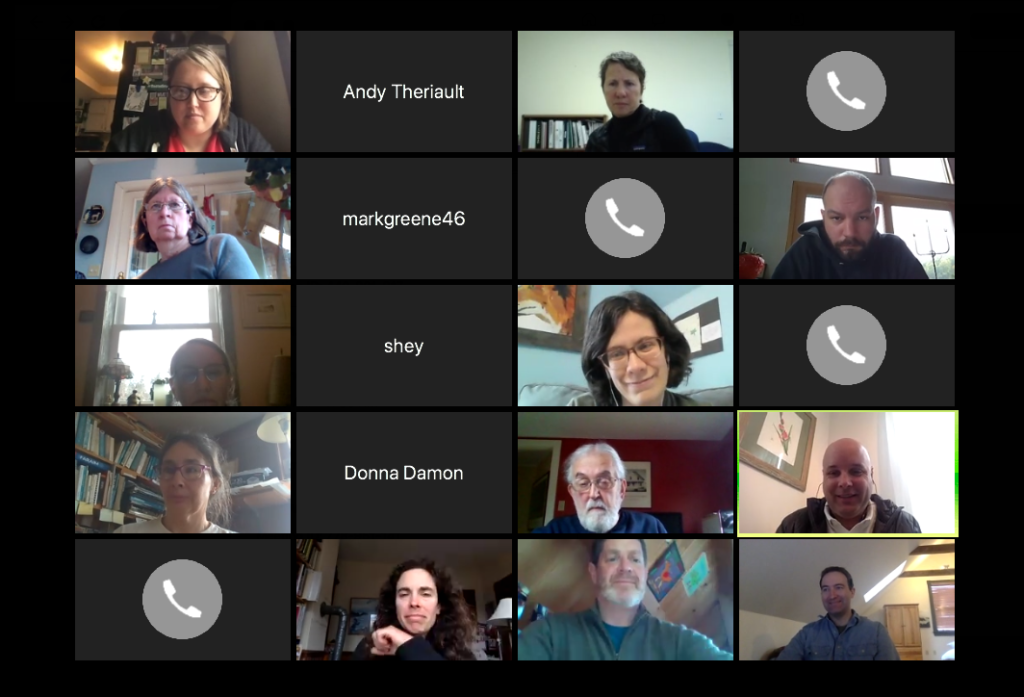In times of crisis, those most prepared can quickly activate established networks to deploy resources and provide support. As the COVID-19 pandemic began to reach Maine, the Island Institute turned to the Maine Islands Coalition (MIC), a network with a 17-year history of helping to solve problems in the year-round islands of Maine.
MIC has been bringing island leaders together since 2003. While there are always one or two remote participants in the coalition’s quarterly meetings, Friday, March 20th was the first time in MIC history when the entire coalition came together virtually. The purpose of the MIC is to connect island leaders across the Maine coast so that they can share resources and build a consistent, though not unified, voice. It is built on the belief that informed and networked leadership, whether formal or informal, is vital to the sustainability of small island communities.
The MIC Representatives, joined by other island officials, were asked to answer the questions, “What is your community doing well in responding to the threat of COVID-19, and what resources do you need?”
What’s Working Well
Communities that had recently built out their high-speed broadband systems praised the connectivity it allowed them, while those who had not yet built out a system were lamenting the slow connections as meetings, work and school have moved online. Communication out to communities was happening largely over community Facebook groups which can serve to connect not only the residents of the island but also those who are off island and wanting to maintain a connection with the community. This raised the concern over how to provide information to those individuals who do not have internet, or who are not comfortable or do not choose to engage in online platforms of communication. Posters in community spaces, delivered to mailboxes, posted at the ferry terminals and on the notice boards of the boats were helping to keep residents connected off-line. Informal community networks were being used to check on at-risk, elderly, and isolated individuals and make sure they have what they need. The latter reminded us of the story told by 2020 Waypoints Forum keynote speaker, Christine Nieves, as she spoke about her community’s outreach to neighbors in the aftermath of Hurricane Maria.
Critical Resource: Ferries
MIC representatives spoke frequently about a set of vital resource points for each island: the stores, ferries, and medical centers. Every island has a ferry. Most ferry companies were taking steps to limit the number of passengers on each run to allow for social distancing. The Casco Bay Ferry Lines has changed its schedule to limit the number of daily trips it takes and is rotating the crews so that they always have a back-up crew available. There are some aspects of ferry living that don’t allow for social distancing, like loading and unloading cargo which are proving to be a challenge.
Critical Resource: Stores
Though every island has a ferry that serves as the main connection point to the mainland, not every island has a store. For those that have limited store access, islanders were finding there were plenty of offers of help from the mainland to gather and send supplies if needed. They were also taking trips to stock up and help neighbors who couldn’t get off island to do the same. But these solutions are dependent on the ferries (or in the case of Matinicus, the air service) maintaining the health of its pilots and crew. For islands that had stores, protocols were being put in place to keep the store staff healthy, such as curb side pick-up, limiting the number of people allowed in the store at any one time, and delivery service options. One challenge with these protocols is how to maintain food safety standards.
Critical Resource: Medical Services
Medical services are limited on every island, but some islands have dedicated health staff and others are reliant on Emergency Medical Technicians. Communities were putting protocols in place in case the virus spreads to the island but recognize that these resources are already stretched thin. There are not enough supplies of personal protective equipment on any island and there is a need for digital thermometers. For larger islands with a medical center, they are working to coordinate disaster preparedness plans with town offices, EMT’s and the ferry service. North Haven and Islesboro are working to create quarantine spaces and are making sure they have enough protective medical equipment. Islands with medical facilities are asking that people who have routine, home-treatable conditions stay at home or consult over the phone rather than come into the medical center. They are also able to test for covid19 in a limit capacity on the island. Other islands are interested in understanding how to get the capability to test in order to limit access and decrease risk for the ferry.
Every island is working to keep their island populations safe, with the resources they have in order to “Save the Summer.” A phrase from North Haven’s Town Manager, Rick Lattimer, expressing the desire to keep the island populations healthy and safe so that they could once again welcome friends, family, and visitors back to the island without increasing everyone’s risk or stressing fragile systems while maintaining the livelihoods that support island families all year-round.
As we go forward into a crisis that changes daily, in a time that we are physically distancing from each other, the Island Institute and the Maine Island Coalition are accelerating our efforts to bring island leaders together. We look forward to continuing to partner with this impressive group in the days and weeks to come, so that we can increase the exchange of information and strengthen the supports available to community leaders in these disruptive times.
Additional Resources
- Minutes from the March 20th Maine Islands Coalition Meeting
- Field Notes: What ‘resilient leadership in times of crisis’ means
- Island Institute Coronavirus resource page


